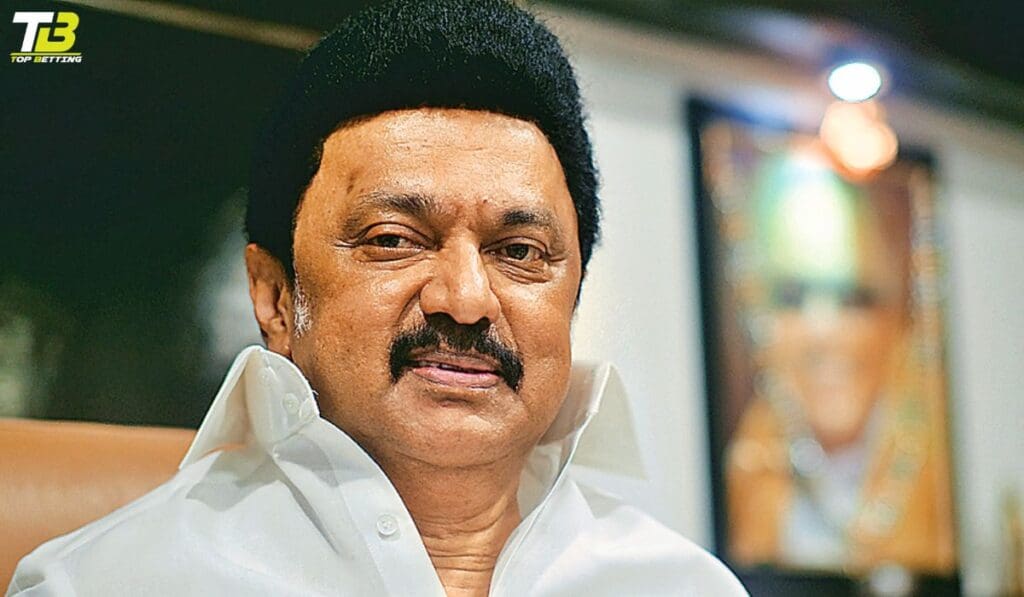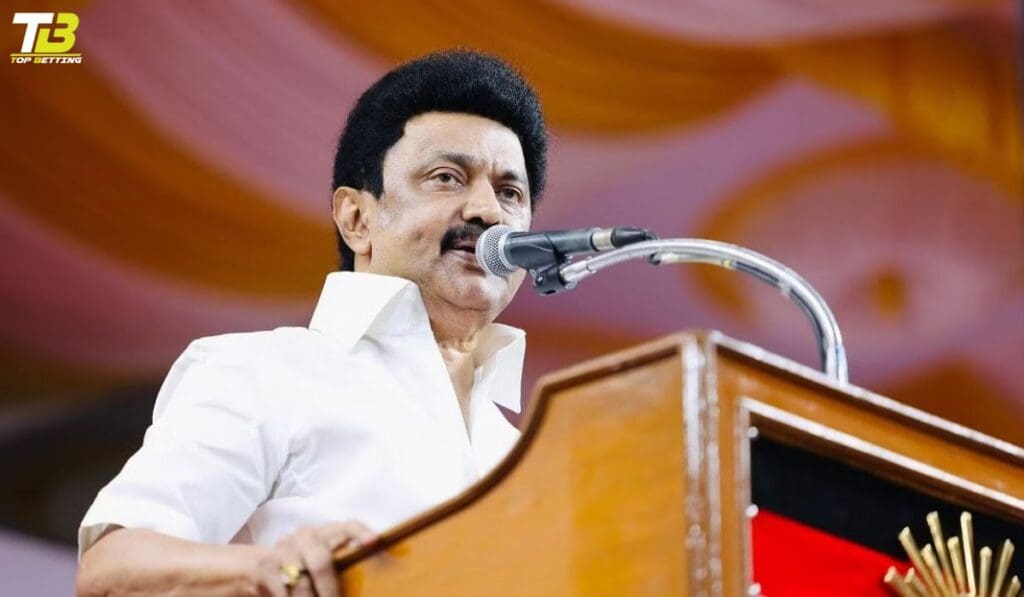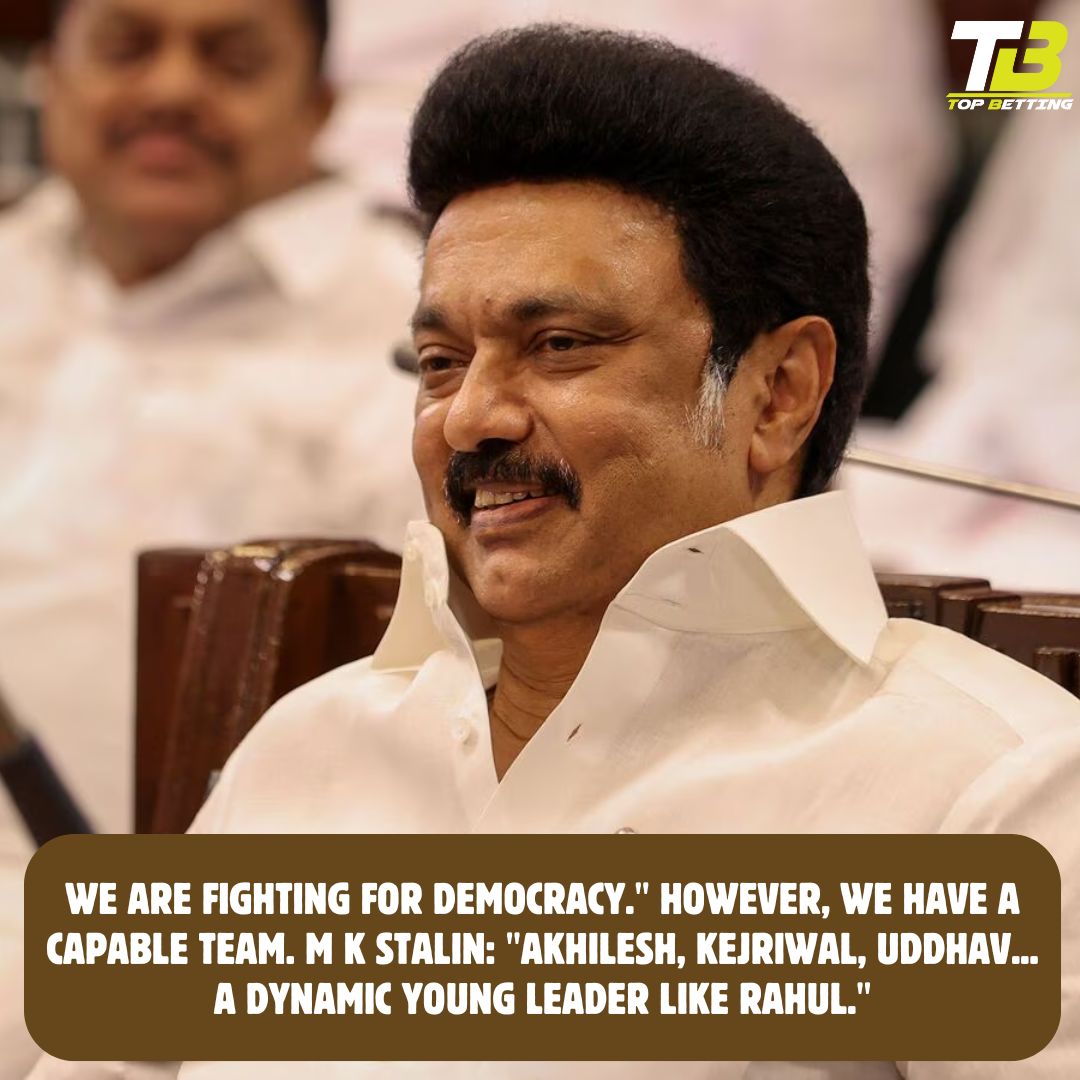
We are fighting for democracy | M K Stalin
DMK leader and Tamil Nadu chief minister: “After ten years in power, instead of showcasing his achievements, Modi is busy dredging up past… using every tool to keep Opposition in check, arresting leaders.”
Ahead of what he terms “a second struggle for Independence” in the next elections, Chief Minister M K Stalin projects confidence while holding up a picture of his late father, late DMK veteran and Tamil Nadu chief minister M Karunanidhi, peering over his shoulder at his Chhitaranjan Salai mansion.
The 74-year-old is now the symbol of the INDIA bloc’s expectations in Tamil Nadu, having allayed any concerns about his ability to succeed Karunanidhi by guiding the DMK to a landslide victory in the state Assembly election in 2021 and a landslide victory in the Lok Sabha vote in 2019.
Stalin, who is aware of this, reiterates his opposition to the BJP in an interview with The Indian Express by comparing it to the Center’s “hegemony.” Stalin responds, “I take it with a smile,” when asked if his lengthy wait to inherit his father’s heritage qualifies him as “a man of patience.” Take-outs:
Numerous Lok Sabha elections have passed. With you spearheading the anti-BJP coalition in Tamil Nadu, what are your thoughts on this one?
We seem to be in the middle of another war for our independence. It ultimately comes down to safeguarding the fundamentals of India, which include federalism, democracy, and our multicultural culture. The DMK and its partners in the INDIA alliance are fighting for democracy in order to protect the country from forces that, to put it bluntly, I would describe as fascist.
“Achieve, or die trying,” was a motto I used to remind my party comrades while I was in charge of the DMK’s youth wing. Furthermore, I have no doubts about our ability to complete the tasks at hand. Not only is this election significant for us, but it’s also a make-or-break election for Indian democracy. However, we have a capable team. Leaders such as Akhilesh Yadav, Arvind Kejriwal, and Uddhav Thackeray share our goals. We understand the seriousness of the situation, which unites us in this battle.
Why did your government choose to file a case in the Supreme Court about the Center’s funding distribution? Does that make sense to do?
It was required of us. When a severe storm and a lot of rain hit Tamil Nadu in December 2023… I personally contacted Prime Minister Narendra Modi and requested that it be deemed a national emergency. But hey, what do you know? The Union government did not provide any financial support. We gave each family hit by the floods Rs 6,000. How can we expect the Union government to provide equitable financial support or a respectable portion of tax revenues when they choose to remain silent even in the face of such tragedies?
We thus brought our battle to the Supreme Court. Legally speaking, financial assistance is our right; it is not a favor. You may argue that this is purely administrative in nature—proclamating a national emergency, etc. Tell me, though, when was the last time the CMs were asked to a conference by the Modi government to resolve these alleged administrative issues? The BJP loves to boast about cooperative federalism and vibrant democracy, but where is it in reality? In actuality, it doesn’t exist.
We were not pleased to have to take the matter all the way to trial, trust me. The unjust and prejudiced treatment we received from the Union administration compelled our hand.
Among your many policies and social welfare programs, what would you consider to be your most important contribution to Tamil Nadu state?
“Everything for Everyone” is the central tenet of the Dravidian model. We truly take pride in this legacy, which dates back to the Dravidian political movement and the Justice Party. We in the Madras Presidency initiated the path towards social justice and education a century ago. Significant turning points in Tamil Nadu’s history, such as the introduction of primary education during the reign of Kamarajar (the previous chief minister Kamaraj) and the growth of higher education under Kalaignar (Karunanidhi), have perpetuated this attitude.

In order to meet the demands of the modern world, our focus has expanded to include making sure that the education offered is of the highest caliber and that skills are developed. During my time as chief minister, I have implemented programs like “Puthumai Penn” and “Tamil Puthalvan,” which provide students with a Rs. 1,000 monthly scholarship. All of this is a part of our purpose to realize Bharathiyar’s (Subramania Bharati) vision of a “educated Tamil Nadu,” where social justice and high-quality education are available to all.
Tamil Nadu was comparable to Uttar Pradesh and Bihar in the 1960s. Yet because to my leader Kalaignar’s inspirational work—often hailed as “the architect of modern Tamil Nadu”—we have changed, making sure that nobody is left behind.
How hard is it to prevent political corruption when contesting elections is getting more and more expensive?
Allow me to transport you back to DMK founder Anna’s (C N Annadurai) early years, in 1967. For Tamil Nadu, he estimated that the parliamentary and assembly elections will cost around Rs 10 lakh. And what do you know? In addition to meeting that, Kalaignar contributed Rs 11 lakh. He was commended for this back then.
Today, the Election Commission has set a spending limit of Rs 95 lakh for parliamentary candidates. It’s no secret that throwing a party now requires enormous financial resources. Transparency is the most important factor, particularly for a developing democracy like India.

Do you believe that the DMK could have made greater use of the film medium—as it formerly did—to spread political messages?
Like the DMK, no movement has employed movies as a tool for political communication. Isn’t that an amazing lineup? Under the DMK umbrella, heavyweights like MGR, S S Rajendran, Sivaji Ganesan, Vagai Chandrasekhar, and Ramanarayanan, as well as Anna, Kalaignar, Asaithambi, and Murasoli Maran, all contributed to the screen. The DMK sowed the seeds of social justice and speaking out against caste injustice, and these ideals are still prevalent in Tamil cinema even though the circumstances have changed. The DMK’s philosophies were the basis for movies like Nenjuku Needhi (2022) and Maamannan (2023), which starred Udhayanidhi, a minister and Stalin’s son.
One form of amusement is the cinema. But our party is aware of its potential and keeps utilizing it. It sustains the dialogue.










